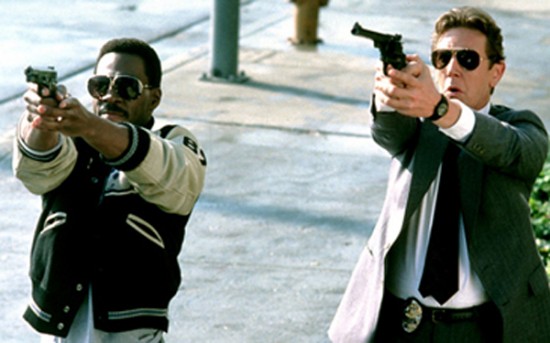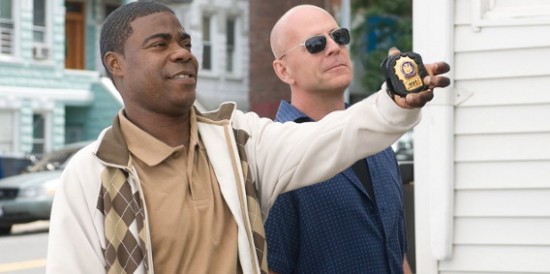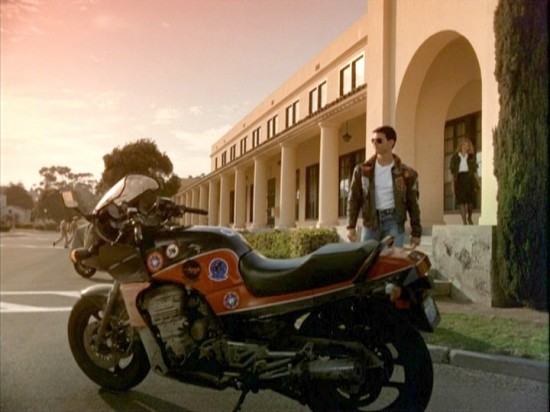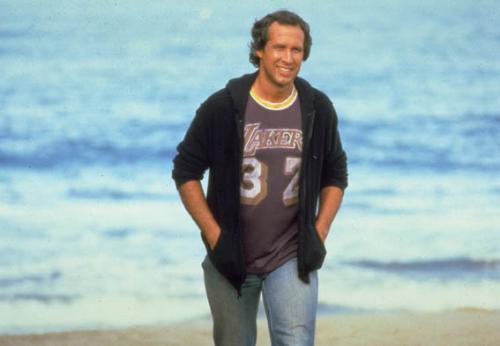Interview: Harold Faltermeyer, Creator Of Soundtrack Themes To Fletch, Beverly Hills Cop, Top Gun, And Kevin Smith's Cop Out
If the '80s gave a sniffling speech at the Decade Achievement Awards, Harold Faltermeyer and his scores would be thanked somewhere after Shigeru Miyamoto and Super Mario Bros. and Magic Johnson's Lakers. A classically trained German composer with an affinity for rock and disco, Faltermeyer got his start in Hollywood assisting mustachioed electro-don Georgio Moroder on soundtracks for Oliver Stone's provocative Midnight Express and Adrian Lyne's jail-bait fave Foxes. With the release of Beverly Hills Cop in 1984, everyone acknowledges how Faltermeyer's theme song, "Axel F," hopped into bed with America's zeitgeist like few songs before or since. The track's equation of urgent nightlife synths plus cool-black-dude drum effects, then buffered to an upbeat Cali finish, not only paralleled the confident, crowd-pleaser m.o. of sure-shot producers Jerry Bruckheimer and Don Simpson, it embodied and celebrated it.
Soon following "Axel F," Faltermeyer crafted incredibly memorable and fun themes/scores for Fletch and Top Gun, rising to the occasion by sonically matching the unmatched charisma of Chevy Chase and Tom Cruise on screen in the mid '80s. Reflecting on the three themes today, not to mention his work on actioners The Running Man and Tango & Cash, it's difficult to express how Faltermeyer shaped the way audiences then and now remember the '80s as a time of just-plain-exciting innocence and excess, a time when the buddy-cop formula and toothy superstar grins felt fresh. It's this feeling and nostalgia Kevin Smith is paying pop-homage to with Cop Out, another bid for a mainstream hit from the '90s slacker auteur starring Bruce Willis and Tracy Morgan. Smith personally requested Faltermeyer—who's remained inactive on major soundtracks since the '92 copper Kuffs—score the film with his signature sound. The catchy result is felt by several critics to be the best thing about the action-comedy. (Stream it here.)
In an interview with /Film, Faltermeyer talked about his creative process and about "crazy shit" including the late Don Simpson's finesse with a Ferrari.
Hunter Stephenson: Hi Mr. Faltermeyer. It's very cool of you to do this interview. Examining the movie scores you've created in your career, many of the films are about cops or rebellious male heroes. Why do you think this is?Harold Faltermeyer: Well, let's face it. It all happens like a chain reaction: you get a first job to score a movie, if the movie does well you get another, even bigger movie and all of a sudden you become an expert in that genre. And boom! You only get movies with cops and heroes versus villains. I am not complaining about that, but I would love to also score a romantic movie at some time. I guess I have developed a certain style of melodies versus rhythm and polyphony which seems to underline and enhance these characters. Your instrumental scores—this might be odd to say—but I feel a few of them have an embedded "moral compass." There is an immersive, party-like intensity in your themes for Fletch, Cop Out and Beverly Hills Cop, but I can almost visualize a gumshoe staying focused as he walks through, and even partakes, in the atmosphere. Do you prefer to convey action and conflict in your scores for cinema? I presume you tend to score to each film's scenes, but what other visuals have inspired the themes I mentioned? I tend to picture '80s-era crime waves and drug-runners at sunset...Harold Faltermeyer: These are quite interesting interpretations. Needless to say, certain chord changes, tempi and melodies are destined to do the job. When I start composing, I tend to go wild with my fantasies and come up with all sorts of crazy shit. There's no limit in musical styles whatsoever. I have found in most instances that initially exaggerating the composition, then bringing it back to "normal" creates the desired emotion. However, what sometimes happens through the "bring back to normal" process—there is a remainder of some "spikes" which didn't join in. I think that makes for the variety of colors in my scores and listeners thus easily interpret all sorts of tension and intension.Surely Kevin Smith was not the first director to request a comeback. I feel like a lot of action comedies—Pineapple Express for one—would have benefited greatly from your work. What did Smith say that convinced you that the timing and his film were right? And did he personally request a more vintage-sounding work?Harold Faltermeyer: Kevin had a clear vision of how the score should sound. As a matter of fact, a majority of the temp score for this film contained cues from my previous work. In one way, that's a composer's dream, in another way, that's a composer's nightmare. It took me a bit of time to get that temp score out of my head. At the beginning, when I started scoring, I never again listened to the temp score. But Kevin was a great support and turned out to be my biggest fan—I was even blushing sometimes about his announcements. What a great guy!
Your instrumental scores—this might be odd to say—but I feel a few of them have an embedded "moral compass." There is an immersive, party-like intensity in your themes for Fletch, Cop Out and Beverly Hills Cop, but I can almost visualize a gumshoe staying focused as he walks through, and even partakes, in the atmosphere. Do you prefer to convey action and conflict in your scores for cinema? I presume you tend to score to each film's scenes, but what other visuals have inspired the themes I mentioned? I tend to picture '80s-era crime waves and drug-runners at sunset...Harold Faltermeyer: These are quite interesting interpretations. Needless to say, certain chord changes, tempi and melodies are destined to do the job. When I start composing, I tend to go wild with my fantasies and come up with all sorts of crazy shit. There's no limit in musical styles whatsoever. I have found in most instances that initially exaggerating the composition, then bringing it back to "normal" creates the desired emotion. However, what sometimes happens through the "bring back to normal" process—there is a remainder of some "spikes" which didn't join in. I think that makes for the variety of colors in my scores and listeners thus easily interpret all sorts of tension and intension.Surely Kevin Smith was not the first director to request a comeback. I feel like a lot of action comedies—Pineapple Express for one—would have benefited greatly from your work. What did Smith say that convinced you that the timing and his film were right? And did he personally request a more vintage-sounding work?Harold Faltermeyer: Kevin had a clear vision of how the score should sound. As a matter of fact, a majority of the temp score for this film contained cues from my previous work. In one way, that's a composer's dream, in another way, that's a composer's nightmare. It took me a bit of time to get that temp score out of my head. At the beginning, when I started scoring, I never again listened to the temp score. But Kevin was a great support and turned out to be my biggest fan—I was even blushing sometimes about his announcements. What a great guy!
Regarding your second question, well, at first, the studio was rather nervous about the idea of a true vintage score but we eventually found and decided on a style that was an homage to the '80s combined with a more modern sound.
 What about Cop Out's New York setting—did you take that into consideration because often your work seems inspired by and made for Los Angeles settings? And if so, how did you update the music to fit the city and its sensibility for a new decade?Harold Faltermeyer: Oh yeah, definitely...the urban feel of Brooklyn needs another chapter, another layer, of edge in music compared to L.A. Therefore, the score is more R&B and hip hop oriented. The music department at Warner Bros.—Darren Higman and Niki Sherrod–introduced me to a great young musician, Sam Spiegel, who contributed great sounds and loops to the project to meet today's sounds.Hearing you speak in the past, and listening to your work, it's clear that you see music as a populist medium. What do you learn from Giorgio Moroder working with him at the start of your career? And aside from being damn good, what about the Beatles, populist in their own right, made them one of your primary influences?Harold Faltermeyer: You named it. The Beatles are simply my big idols. I have always attempted to write catchy melodies that are made to last. Sometimes I succeeded, sometimes not...Giorgio is a gifted writer and I learned a lot from him. He had a great talent to reduce [scores] to the essentials and come to the point quickly—the music struck me and stuck with me.Might you name three films for us—one from the '80s, '90s, and aughts—that you would like to have scored or that you especially liked by another composer and artist?Harold Faltermeyer: Hard to say. There are so many great movies out there, but here are a few I would have loved to score: The Name Of The Rose, or Who Framed Roger Rabbit or The Mission. And I should add that Ennio Morricone is easily one of my all time favorite composers.
What about Cop Out's New York setting—did you take that into consideration because often your work seems inspired by and made for Los Angeles settings? And if so, how did you update the music to fit the city and its sensibility for a new decade?Harold Faltermeyer: Oh yeah, definitely...the urban feel of Brooklyn needs another chapter, another layer, of edge in music compared to L.A. Therefore, the score is more R&B and hip hop oriented. The music department at Warner Bros.—Darren Higman and Niki Sherrod–introduced me to a great young musician, Sam Spiegel, who contributed great sounds and loops to the project to meet today's sounds.Hearing you speak in the past, and listening to your work, it's clear that you see music as a populist medium. What do you learn from Giorgio Moroder working with him at the start of your career? And aside from being damn good, what about the Beatles, populist in their own right, made them one of your primary influences?Harold Faltermeyer: You named it. The Beatles are simply my big idols. I have always attempted to write catchy melodies that are made to last. Sometimes I succeeded, sometimes not...Giorgio is a gifted writer and I learned a lot from him. He had a great talent to reduce [scores] to the essentials and come to the point quickly—the music struck me and stuck with me.Might you name three films for us—one from the '80s, '90s, and aughts—that you would like to have scored or that you especially liked by another composer and artist?Harold Faltermeyer: Hard to say. There are so many great movies out there, but here are a few I would have loved to score: The Name Of The Rose, or Who Framed Roger Rabbit or The Mission. And I should add that Ennio Morricone is easily one of my all time favorite composers. When Top Gun came out in 1986, what was it like seeing it and hearing your score with an audience? Did you have a chance to celebrate with Don Simpson, and what do you remember most about him? And how would you describe that time in Hollywood in general?Harold Faltermeyer: It was incredible! And seeing Top Gun together with an all-American audience, I suddenly realized what an honor it was, being chosen to score this heroic epic movie. I liked Don Simpson a lot. What a crazy guy! I remember, he came into the studio one night, and he was soaking wet, 'cause he was driving his Ferrari over a fire hydrant. [laughs]
When Top Gun came out in 1986, what was it like seeing it and hearing your score with an audience? Did you have a chance to celebrate with Don Simpson, and what do you remember most about him? And how would you describe that time in Hollywood in general?Harold Faltermeyer: It was incredible! And seeing Top Gun together with an all-American audience, I suddenly realized what an honor it was, being chosen to score this heroic epic movie. I liked Don Simpson a lot. What a crazy guy! I remember, he came into the studio one night, and he was soaking wet, 'cause he was driving his Ferrari over a fire hydrant. [laughs]
However, Don Simpson, he had an incredible talent for bringing the right people together for the right project and making the right calls. The chemistry between him and Jerry Bruckheimer really was pure magic. Hollywood at that time was rather wild, I guess. However, with the speed of today's communication—the new digital techniques which almost don't allow you to even breathe—there's no room for that special '70s [and '80s] craziness anymore.
You also scored High School, a pot comedy being released this year. What can we expect from the score and did you take its stoner-centric plot into account?Harold Faltermeyer: What's cool is that High School demanded a totally different score from what I am known for. It's haunting, mystical, psychedelic–sometimes orchestral—and made to illustrate the two worlds of the "straight" high school and its principal—who is played by Michael Chiklis—on one side and the crazy, psychic, paranoid world of the stoners and their supplier named Psycho Ed—Adrien Brody—on the other. When I first began work on it, I wrote a five-minute suite called "Weed Demon" and I played it for the director, John Stalberg. He loved it!Listen to Harold Faltermeyer's Cop Out score here.Hunter Stephenson can be reached on Twitter.
Let's take a look at some of the highlights in Faltermeyer's career.
Harold Faltermeyer – "Cop Out Theme" (2010)
From its start, the "Cop Out Theme" makes the listener aware using louder-than-usual drum effects (welcome to the gritty city, bitch!) that Faltermeyer has updated his sound for 2010, but refuses to fix what ain't broke. (Do they say "ain't" in Germany?) The full score may cause one to pause and wonder why, after so many (dismal) buddy-cop comedies, Hollywood still hasn't found a composer anywhere near as vital and synonymous with the genre's tested formula of quips and gunshots as Harold F. His "Cop Out Theme" does what it's supposed to do—evoke the genre's hey day like Tracy had a good day—but unlike other scores by Faltermeyer, his signature, brisk cool is arguably not complimented by the film or Kevin Smith. Let's hope when and if Fletch Won becomes a reality that only the former participates.
Harold Faltermeyer – "Fletch Theme" (1985)
This is one of the all time best examples of a theme perfectly matching a movie's plot, its tone (smartly favoring drama and mystery over comedy), its decade, its setting, and its protagonist. Irwin Fletcher is a loner journalist with a decent tan whose unwashed Lakers jersey and shaggy hair never undermine his relentless damn-The-Man approach when stumbling into a major page one expose.
Faltermeyer's theme builds like a humid L.A. day spent in search of a revelatory clue in the case and like a cool cruise in a convertible that bursts into a hot pursuit. This is not the theme song of a poof or a prankster; Fletch revels and excels in high stakes but with a keen eye for fun and the absurd. Like Chevy Chase, Fletch (in both the film and in creator Gregory McDonald's excellent novels) is a rare example of a handsome, untroubled dude who is actually really funny. Faltermeyer's theme and score help us enjoy this about the performance and film; the music is crafted by a dude just as enthused and entertained as the audience.
Fletch often views life like he's a character in a movie, and Faltermeyer's "exaggerated then back to regular" style perfectly emphasizes this cinematic heightening of reality. It's easy to picture Fletch hearing it and finding it worthy of a smirk of approval. [Insert with "a Bloody Mary joke and a steak sandwich" joke here] Listen to the theme on a long drive or in the shower in 2010: that shit will make any event seem privy and important.
Harold Faltermeyer – "Diggin'" – Fletch (1985)
Harold Faltermeyer – "Top Gun Anthem" (1986)
If the cock pit of a fighter jet could sing to America, it would sound like this. It's the sound of a determined ego soaring up and over a mental Mount Everest of cocaine with bro guitars aligning beside it like back up in a videogame. In retrospect, the theme captures the duality of Tom Cruise's go-getter innocence and Don Simpson riding Hollywood raw in the '80s. Sure, the sappy air of blockbuster manipulation could be described as cheese today, but the theme is so damn sure of what it wants and needs to be that you better hold your girlfriend's hand a little tighter to show her you have what it takes.
Harold Faltermeyer – "Axel F" – Beverly Hills Cop (1984)
A cultural phenomenon that hasn't exited the pop-culture sphere since the debut of Eddie Murphy's smartass classic, the "Axel F" instrumental experienced a huge surge in popularity last decade in the form of a rather juvenile remix that topped the U.K. charts. Breezier than the similar "Fletch Theme" and dotted with palm accents, the track is in step with its quick, hip and casual namesake Axel Foley. To this day, it captures the energetic essence of an '80s summer like few pop songs, instrumental or otherwise. In 2009, the track was featured in the hit animated film, Monsters and Aliens, in a scene where the U.S. president attempts to contact alien life with music. That pretty much says it all regarding its permanence. (And no, the alien life wasn't Eddie Murphy.)
Harold Faltermeyer – "Main Theme" – Tango & Cash (1989)
Part of the reason why Tango & Cash, a kitchen-sink buddy-cop actioner starring Sylvester Stallone and Kurt Russell, is fondly remembered in spite of its trashiness is that it represented the end of The Stallone Hero Era and the beginning of jaded irony taking hold of youth. Muscled gun-machines would go out of style in favor of Bruce Willis's unlucky everyman.
Faltermeyer's score, which was a pre-Internet rarity sought out by cultists for several years, almost marked an end to an era: his own. The score would be one of Harold F.'s last for Hollywood (followed only by Kuffs in 1992). Even upon the release of Tango & Cash, there were plenty of action fans who asked, "Why don't they make them like this anymore?" and it's interesting how the petering out of the visuals and sounds were receiving with wistfulness. Faltermeyer perhaps got out at the right time, returning to Germany to concentrate on his family. By the time he returned in 2010 (missing Stallone's comeback by only by a few years) his scores felt untouched by irony. Could it be that movies were so free of Internet complaining then?
